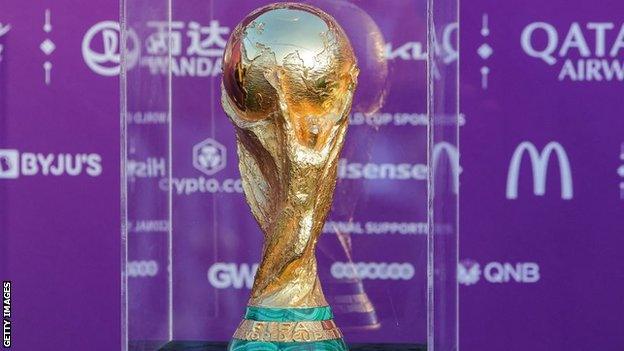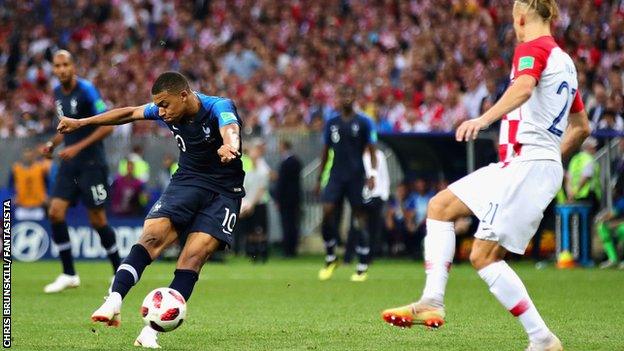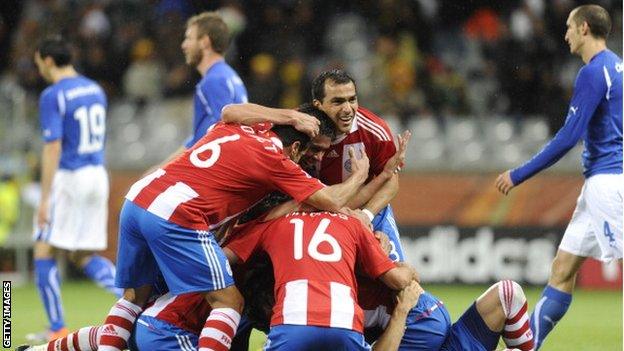World Cup 2022: What the stats tell us might happen in Qatar in November and December
- Published

Which team will get their hands on the World Cup trophy on 18 December?
What can previous World Cups tell us about what to expect in Qatar?
Is this year's World Cup tougher? Should teams who qualified through the play-offs be written off now? Does playing in Asia suit certain countries?
We look at these factors - as well as many others - to see which teams could be well placed for a successful World Cup.
There have been six previous tournaments having the same format of 32 teams sorted into eight groups of four and it is these six tournaments that have provided 384 games to look at and see if any patterns emerge.
In the analysis below we will be looking at these six tournaments - from 1998-2018 - unless otherwise noted.
How much impact does location have on the performance of travelling teams?
In the past three tournaments to be played in Europe, there were European nations filling 10 of the 16 knockout places. When the finals have taken place outside Europe this figure drops to an average of seven.
South American teams benefit the most from this drop, while twice the number of Asian teams reach the knock-outs when the finals aren't in Europe.
Is there a link between qualifying and how far teams progress in the finals?
Five of the past six World Cup winners were European - and with the exception of 1998 champions France, who made that tournament automatically as hosts, all had excellent qualifying campaigns.
The other four champions - Italy in 2006, Spain in 2010, Germany in 2014 and France in 2018 - either went unbeaten or lost only once in 10 qualifying games. These win percentages (with draws counting half a win) were 80% and above.
In qualification for this year's event, a whole host of European nations have met the 80% threshold: Denmark (95%), England and Germany (90%), Serbia and Belgium (87.5%), Spain, Switzerland and France (all 81.3%) and Croatia and the Netherlands (both 80%).
How 'strong' is this year's line-up based on world rankings compared to earlier tournaments?
Using the Fifa world ranking of teams at the start of a tournament, we can get a feel for how competitive a tournament could be. Here are the rankings spreads for the 32 teams for each tournament:
Ranking spread | |
|---|---|
1998 | 1-74 |
2002 | 1-50 |
2006 | 1-61 |
2010 | 1-105 |
2014 | 1-62 |
2018 | 1-67 |
2022 | 1-61 |
Because of Fifa rules dictating the number of teams from each continent, there are teams not at the finals that rank higher than some that are.
The most obvious absentees this time are Italy - sixth in the world - but Colombia (17), Peru (23), Sweden (25), Ukraine (27), Chile (29) and Nigeria (32) would all have been involved if world rankings decided qualification irrespective of location.
While seven lower-ranked teams taking part this time might seem like a large proportion, it is actually the lowest number during the 32-team era. Some finals have had as many as 11 teams from outside the top 32.
So this time it is a tough tournament to succeed in.
And the combined rankings suggest England and Wales are in the toughest group in Qatar - it's the only one where every team are in the world's top 20 as of 30 October.
2022 World Cup groups and world rankings (as at 30 October) |
|---|
A - Netherlands (8), Senegal (18), Ecuador (44), Qatar (50) |
B - England (5), USA (16), Wales (19), Iran (20) |
C - Argentina (3), Mexico (13), Poland (26), Saudi Arabia (51) |
D - France (4), Denmark (10), Tunisia (30), Australia (38) |
E - Spain (7), Germany (11), Japan (24), Costa Rica (31) |
F - Belgium (2), Croatia (12), Morocco (22), Canada (41) |
G - Brazil (1), Switzerland (15), Serbia (21), Cameroon (43) |
H - Portugal (9), Uruguay (14), South Korea (28), Ghana (61) |
How well do play-off winners usually do?
Wales, in their first tournament for 64 years, qualified through the European play-offs along with Poland and Portugal.
At first glance it might seem to be a back-door route - but recent history shows the teams who qualify that way can make a major impact.
When comparing European teams, 67% of play-off qualifiers reach the knockout stages, compared with only 57% of teams that qualify directly.
Two of the past six World Cup finals have featured European teams that got in via the play-offs -Germany in 2002 and Croatia in 2018. In addition, Croatia (1998) and Turkey (2002) got to the final four and a further three play-off sides reached the quarter-finals.

France won the 2018 World Cup, winning 4-2 in the final against a Croatia side who defeated Greece in a two-legged play-off to earn their place in Russia
Why do defending champions struggle?
Since the 1990s, World Cup holders have won a grand total of one knockout match in five tournaments, when Brazil beat Ghana in 2006. In fact the cup hasn't been retained since 1962 and in the 14 tournaments since, only two holders have gone beyond the quarter-finals.
The holders' troubles often start with match one. In the 12 tournaments since England won their opening game against Romania in 1970, only three defending champions have opened with a win. And four of the past five defending champions haven't even got out of their group.
Why? Well, four years is a long time in football. On average, only 50% of players who start a final for the winners will start the first group game of the next tournament.
Italy fielded only three members of their starting line-up from the 2006 final when they began their defence with a draw against Paraguay in 2010.

Italy won the World Cup in 2006 but four years later drew 1-1 with Paraguay in their first match and failed to win a game at the 2010 event, finishing bottom of their group
How many times does a lower-ranked team cause an upset?
If you expect the top two ranked teams always to emerge from each group, you'll be surprised.
It's normal for six of the 16 knockout places to be taken by teams that were the third and fourth-ranked teams in their respective groups. That is an upset rate of 32%. Over these same six tournaments, the knockout games have been won by 34% of the lower-ranked teams.
Biggest upsets in World Cup knockout matches - according to the Fifa rankings | |||
|---|---|---|---|
Year | Winner (rank) | Loser (rank) | Difference |
2002 | South Korea (40) | Italy (6) | 34 places |
2002 | Senegal (42) | Sweden (19) | 23 places |
2002 | South Korea (40) | Spain (8) | 32 places |
2018 | Russia (70) | Spain (10) | 60 places |
Three of the four biggest upsets have been caused by the hosts - twice via penalties and once with a golden goal.
Whatever happens over the next five weeks, there are likely to be plenty more shocks, drama and controversy ahead.